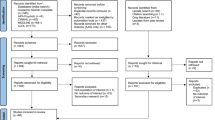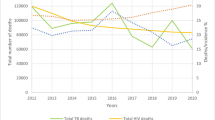Abstract
This paper reviews the experience of the Istanbul Tuberculosis Aid Program, which targeted tuberculosis (TB) disease in the growing irregular migrant populations of Istanbul. This experience illustrated the importance of community-based public health interventions when dealing with an infectious disease like TB among vulnerable groups. Our data is derived primarily from a qualitative study carried out with program stakeholders. We summarize lessons for success of ITAP as: (1) Strengthening impact and outreach of TB intervention among irregular migrant communities through involvement of multiple stakeholders (2) Increasing TB awareness through a community targeted approach (3) Increasing TB contact tracing and treatment success among infected irregular migrants, and, (4) Improving overall health seeking behavior of irregular migrants through empowerment and trust. Given these particularities we list our policy suggestions for revision of regulations regarding TB control and healthcare needs of irregular migrant populations.
Similar content being viewed by others
Notes
The main reason for ITAP’s discontinuation was an inability to institutionalize the program despite several efforts made in this direction. Under Turkish legislation the condition for a civil society initiative to receive foreign funding is that it must be implemented through an existing Turkish institution. Program coordinators did approach three different organizations on this matter, however each of them remained reserved about taking up such a program because it involved working with irregular migrants, which was seen as a “tricky” issue that could upset state authorities. Consequently, a formal bank account could not be obtained for ITAP, funding resources obtained from abroad could not be transferred to Turkey and efforts to raise additional funds had to remain limited to the charitable contributions of immediate social circles in Turkey.
The International Organization for Migration defines an irregular migrant as “A person who, owing to unauthorized entry, breach of a condition of entry, or the expiry of his or her visa, lacks legal status in a transit or host country. The definition covers inter alia those persons who have entered a transit or host country lawfully but have stayed for a longer period than authorized or subsequently taken up unauthorized employment (also called clandestine/undocumented migrant or migrant in an irregular situation). The term ‘irregular’ is preferable to ‘illegal’ because the latter carries a criminal connotation and is seen as denying migrants' humanity [8].”
References
Gandy M, Zumla A. The resurgence of disease: social and historical perspectives on the ‘new’ tuberculosis. Soc Sci Med. 2002;55(3):385–96.
Navin T, McNabb SJ, Crawford JT. The continued threat of tuberculosis. Emerg Infect Dis. 2002;8(11):1187.
Lienhardt C, Glaziou P, Uplekar M, Lönnroth K, Getahun H, Raviglione M. Global tuberculosis control: lessons learnt and future prospects. Nat Rev Microbiol. 2012;10:407–16.
Mitnick C, Bayona J, Palacios E, Shin S, Furin J, Alcantara F, Sanchez E, Sarria M, Becerra M, Fawzi MC, Kapiga S, Neuberg D, Maguire JH, Kim JY, Farmer P. Community-based therapy for multidrug-resistant tuberculosis in Lima, Peru. N Engl J Med. 2003;348(2):119–28.
World Health Organization. Community Contribution to TB Case: Practice and Policy. 2003. WHO Stop TB Department. (WHO/CDS/TB/2003.312) WHO, Geneva.
World Health Organization. Community involvement in tuberculosis care and prevention: towards partnerships for health. 2008. (WHO/HTM/TB/2008.397) WHO, Geneva.
World Health Organization. Engage-TB: Integrating community-based tuberculosis activities into the work of nongovernmental and other civil society organizations. 2012. (WHO/HTM/TB/2012/8) WHO, Geneva.
International Organization for Migration. International Migration Law N°25—Glossary on Migration. Geneva: IOM; 2004. http://publications.iom.int/bookstore/free/IML_1_EN.pdf.
Icduygu A, Biehl K. The changing trajectory of migration to Turkey. In: Balbo M, Icduygu A, Perez J, editors. Countries of Migrants, Cities of Migrants: Italy, Spain, Turkey. Istanbul: Isis Press; 2013. p. 91–126.
Icduygu A, Aksel D. Irregular migration in Turkey. Turkey: International Organization for Migration (IOM); 2012. http://www.turkey.iom.int/documents/IrregularMigration/IOM_Report_11022013.pdf.
Toksoz G, Seyhan E, Kaska S. Irregular labour migration in Turkey and situation of migrant workers in the labour market. International Organization for Migration (IOM): Turkey; 2012.
Gocmenlik ve Saglik Calistayi Raporu, Istanbul Tabip Odasi ve Gocmen Dayanisma Agi, 29 Eylul 2013 (Migrants and Health Workshop Report, Istanbul Chamber of Physicians and Migrants Solidarity Network, 29 September 2013). https://docs.google.com/file/d/0Bw2YmRYA7WVHU2RkVHdnRGZsY1psdk1TX1NheFh1cU5hN0pr/edit?pli=1.
Kucuk C, Polat C, Gencer R, Polat D, Dincel Asoglu G, Koksalan K, Kilicaslan Z. Tuberculosis Cases Amongst Foreign Immigrants in Istanbul. Toraks Dergisi 2005; 6(1): 8th Annual Congress Abstract Book, PD 291, p 10.
Ozdil K. Creating new spaces, claiming rights: West African immigrants in Istanbul. In: Eckardt F, Wildner K, editors. Public Istanbul: spaces and spheres of Istanbul. Bielefeld: Verlag; 2008. p. 279–98.
Suter B. Perceptions, contestations and negotiations on race, ethnicity and gender: the case of sub-saharan migrants in Istanbul. SBF Dergisi. 2013;68(1):39–58.
Yaghmaian B. Afrika Diasporasi: Turkiye’deki Afrikali Gocmenlerin Drami (African Diaspora: the Drama of African Migrants in Turkey). Birikim Dergisi. 2003;2003(175–176):140–8.
Yukseker D, Brewer KT. Astray and stranded at the gates of the European Union: African transit migrants in Istanbul. New Perspect Turk. 2011;44:129–59.
Carballo M, Nerukar A. Migration, refugees, and health risks. Emerg Infect Dis. 2001;7:556–60.
Gushulak BD, Weekers J, MacPherson DW. Migrants and emerging public health issues in a globalized world: threats, risks and challenges, an evidence-based framework. Emerg Health Threats J. 2010;2:e10.
Rieder H, Zeweger J, Raviglione M, Keizer ST, Migliori GB. Tuberculosis control in Europe and international migration. Eur Respir J. 1994;7:1545–53.
Ospina JE, Orcau À, Millet J, Sánchez F, Casals M, Caylà JA. Community health workers improve contact tracing among immigrants with tuberculosis in Barcelona. BMC Public Health. 2012;12:158.
Shin S, Furina J, Bayona J, Matec K, Kim JY, Farmer P. Community-based treatment of multidrug-resistant tuberculosis in Lima, Peru: seven years of experience. Soc Sci Med. 2004;59(7):1529–39.
Mangura B, Napolitano E, Passannante M, Sarrel M, McRonald R, Galanowsky K, Reichman L. Directly observed therapy (DOT) is not the entire answer: an operational cohort analysis. Int J Tuberculosis Lung Disease. 2002;6(8):654–61.
Okie S. Immigrants and health care –at the intersection of two broken systems. N Engl J Med. 2007;357(6):525–9.
Acknowledgments
We would like to express our gratitude to Prof. Dr. Zeki Kilicaslan, who was key in securing the collaboration of IVSD in every stage of ITAP, for his equally generous support in the preparation of this manuscript. We are also thankful too all participants in this study for sharing their valuable experiences with us.
Ethical Standard
This study was originally presented at the Mobility and Health Panel of the Annual Meeting of Reproductive Health Working Group (Oman on 27–29 January 2014). Following the high interest and encouraging comments of panel participants, authors were convinced by the relevance and timeliness to more thoroughly analyze and internationally publish on these experiences. As this idea developed after research and writing of the original paper had already been completed, review and approval by an Ethics Committee was not sought.
Author information
Authors and Affiliations
Corresponding author
Appendix
Appendix
List of interviewees with pseudonyms:
-
1.
Ziya, male, 57, medical doctor.
-
2.
Bahar, female, 46, medical doctor.
-
3.
Bernard, male, 52, CHW/interpreter.
-
4.
Jamal male, 41, CHW/interpreter.
-
5.
Samuel, male, 42, CHW/interpreter.
-
6.
Lisa female, 63, director of a faith-based organization.
-
7.
Ali, male, 45, medical doctor.
-
8.
Nese, female, 45, program co-coordinator.
-
9.
Mahmoud, male, 44, Dr./program advisor.
-
10.
Rob, male, 38, CHW/interpreter.
Rights and permissions
About this article
Cite this article
Yasin, Y., Biehl, K. & Erol, M. Infection of the Invisible: Impressions of a Tuberculosis Intervention Program for Migrants in Istanbul. J Immigrant Minority Health 17, 1481–1486 (2015). https://doi.org/10.1007/s10903-014-0115-7
Published:
Issue Date:
DOI: https://doi.org/10.1007/s10903-014-0115-7




